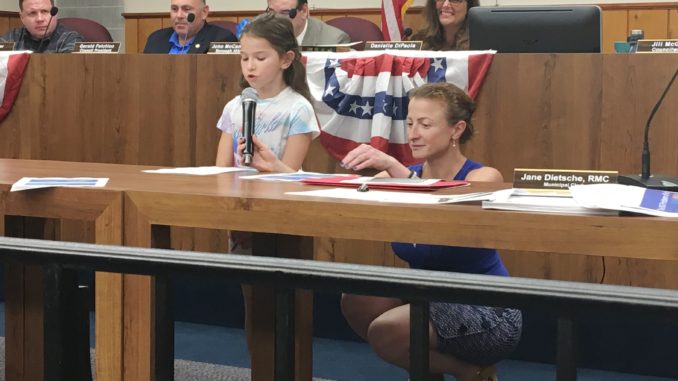
EMERSON, N.J.—The Borough Council agreed Aug. 13 to forward a proposal to the Emerson Environmental Commission on the subject of single-use plastic shopping bags and the harm they, among other plastic litter, do to marine life.
The proposal, banning plastic shopping bags in town and replacing them with paper bags, came from a young lady, Danica Rubinstein, who had reached out to Mayor Danielle DiPaola with a handwritten appeal that then turned in a formal presentation at the full council meeting.
The letter read, “Dear Mrs. DiPaola: My name is Danica and I am turning 9 on Aug. 26. I love sea animals and other bodies of water. But plastic is destroying the bodies of water along with the animals. So maybe our town could consider not allowing plastic bags in stores and instead having paper bags. Thank you!”
DiPaola then invited Danica to have her request heard by the governing body in full.
Danica based her presentation on a PowerPoint slide deck she printed out and referred to with a polished confidence.
Supporting Danica at the meeting were her brother Damien and parents Anna and Sergei.
Danica’s research showed plastic is harmful to such marine life as sea turtles, which “swim into plastic bags but can’t get out” and baby whales, which “suck on the bags while all the chemicals are going into their bodies.”
She also described “trash islands” out at sea. The world’s largest, the Great Pacific Garbage Patch, covers 600,000 square miles between Hawaii and California.
She also described her success in convincing her parents to switch to reusable bottles and bags, suggested supermarkets could stop offering plastic bags, proposed consumers shift to metal water bottles, and said making the world a better place was possible by taking care of the oceans.
Danica also pointed out that Emerson would not be the first New Jersey town to adopt a plastic bag ban. She cited a recent news feature that says many municipalities and one county in the Garden State have plastic bag regulations on the books, with more passing related ordinances waiting to go into effect.
(At press time, The Borough of Paramus passed a plastic bag and polystyrene ban ordinance.)
Asked her view, Emerson Environmental Commission Chair Stephanie Clark told Pascack Press the EEC, composed of volunteers, took the matter up earlier in the year.
“While exploring a ban on bags specifically is timely, it’s not the solve-all solution. Globally to locally we need to embrace and adopt a holistic sustainable plastics vision for any of this to make an impact long-term,” she said.
She noted that Danica’s proposal is being sent over at the EEC’s next meeting for discussion, “however, we hold no power in passing the ordinance. What we can do is provide guidance and help advise our mayor and council per our collective expertise.”
Pascack Press also reached out to the Association of New Jersey Environmental Commissions for comment. The organization’s executive director, Jennifer M. Coffey, replied, “ANJEC heartedly applauds Danica for her passion and fearless voice. She is right. We need to end this plastic pollution problem, and an important step to doing so is banning single-use plastic bags.”
She added, “Danica reminds us how important it is to take action now.”
DiPaola told Pascack Press, “I was quite impressed with Danica’s presentation. That is one driven little lady. She’s going to achieve great things.”
Gov. Phil Murphy last summer vetoed a bill banning plastic bags while imposing a nickel fee on paper bags. Murphy explained of his veto that he wanted a stronger version.
As WHYY reported, since then, more than 50 New Jersey municipalities have passed ordinances to reduce the use of plastic bags, straws, balloons, and Styrofoam containers, with other states following suit.
Maine banned polystyrene containers. New York prohibited single-use plastic bags in March.
Advocates see promise in state legislation (S-2776) pending toward a uniform statewide policy.
WHYY noted Sen. Bob Smith (D-Piscataway), the chairman of the Senate Environment and Energy Committee and sponsor of the statewide ban, welcomed local governments passing laws to address the problem.
“The towns have been the leaders on this,” he said. “Their effort has put us in a better position to pass this.”
He said he hoped the bill would advance after the fall election. “If not then, it will be the first bill we’ll tackle in 2020,” he added.
